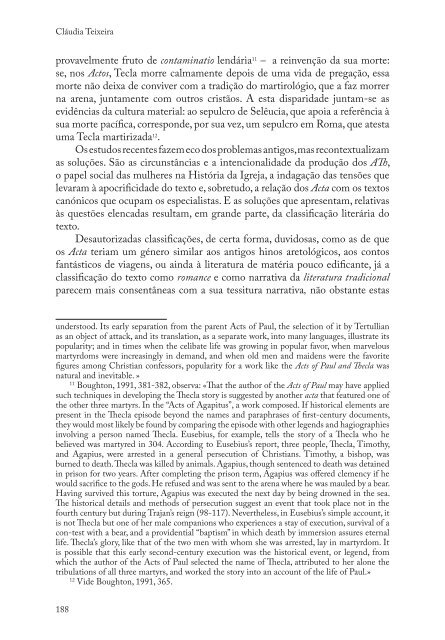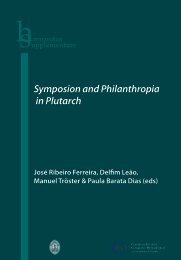Paulo de Tarso: Grego e Romano, Judeu e Cristão - Universidade ...
Paulo de Tarso: Grego e Romano, Judeu e Cristão - Universidade ...
Paulo de Tarso: Grego e Romano, Judeu e Cristão - Universidade ...
You also want an ePaper? Increase the reach of your titles
YUMPU automatically turns print PDFs into web optimized ePapers that Google loves.
Cláudia Teixeira<br />
provavelmente fruto <strong>de</strong> contaminatio lendária 11 – a reinvenção da sua morte:<br />
se, nos Actos, Tecla morre calmamente <strong>de</strong>pois <strong>de</strong> uma vida <strong>de</strong> pregação, essa<br />
morte não <strong>de</strong>ixa <strong>de</strong> conviver com a tradição do martirológio, que a faz morrer<br />
na arena, juntamente com outros cristãos. A esta disparida<strong>de</strong> juntam-se as<br />
evidências da cultura material: ao sepulcro <strong>de</strong> Selêucia, que apoia a referência à<br />
sua morte pacífica, correspon<strong>de</strong>, por sua vez, um sepulcro em Roma, que atesta<br />
uma Tecla martirizada 12 .<br />
Os estudos recentes fazem eco dos problemas antigos, mas recontextualizam<br />
as soluções. São as circunstâncias e a intencionalida<strong>de</strong> da produção dos ATh,<br />
o papel social das mulheres na História da Igreja, a indagação das tensões que<br />
levaram à apocrificida<strong>de</strong> do texto e, sobretudo, a relação dos Acta com os textos<br />
canónicos que ocupam os especialistas. E as soluções que apresentam, relativas<br />
às questões elencadas resultam, em gran<strong>de</strong> parte, da classificação literária do<br />
texto.<br />
Desautorizadas classificações, <strong>de</strong> certa forma, duvidosas, como as <strong>de</strong> que<br />
os Acta teriam um género similar aos antigos hinos aretológicos, aos contos<br />
fantásticos <strong>de</strong> viagens, ou ainda à literatura <strong>de</strong> matéria pouco edificante, já a<br />
classificação do texto como romance e como narrativa da literatura tradicional<br />
parecem mais consentâneas com a sua tessitura narrativa, não obstante estas<br />
un<strong>de</strong>rstood. Its early separation from the parent Acts of Paul, the selection of it by Tertullian<br />
as an object of attack, and its translation, as a separate work, into many languages, illustrate its<br />
popularity; and in times when the celibate life was growing in popular favor, when marvelous<br />
martyrdoms were increasingly in <strong>de</strong>mand, and when old men and mai<strong>de</strong>ns were the favorite<br />
figures among Christian confessors, popularity for a work like the Acts of Paul and Thecla was<br />
natural and inevitable. »<br />
11 Boughton, 1991, 381-382, observa: «That the author of the Acts of Paul may have applied<br />
such techniques in <strong>de</strong>veloping the Thecla story is suggested by another acta that featured one of<br />
the other three martyrs. In the “Acts of Agapitus”, a work composed. If historical elements are<br />
present in the Thecla episo<strong>de</strong> beyond the names and paraphrases of first-century documents,<br />
they would most likely be found by comparing the episo<strong>de</strong> with other legends and hagiographies<br />
involving a person named Thecla. Eusebius, for example, tells the story of a Thecla who he<br />
believed was martyred in 304. According to Eusebius’s report, three people, Thecla, Timothy,<br />
and Agapius, were arrested in a general persecution of Christians. Timothy, a bishop, was<br />
burned to <strong>de</strong>ath. Thecla was killed by animals. Agapius, though sentenced to <strong>de</strong>ath was <strong>de</strong>tained<br />
in prison for two years. After completing the prison term, Agapius was offered clemency if he<br />
would sacrifice to the gods. He refused and was sent to the arena where he was mauled by a bear.<br />
Having survived this torture, Agapius was executed the next day by being drowned in the sea.<br />
The historical <strong>de</strong>tails and methods of persecution suggest an event that took place not in the<br />
fourth century but during Trajan’s reign (98-117). Nevertheless, in Eusebius’s simple account, it<br />
is not Thecla but one of her male companions who experiences a stay of execution, survival of a<br />
con-test with a bear, and a provi<strong>de</strong>ntial “baptism” in which <strong>de</strong>ath by immersion assures eternal<br />
life. Thecla’s glory, like that of the two men with whom she was arrested, lay in martyrdom. It<br />
is possible that this early second-century execution was the historical event, or legend, from<br />
which the author of the Acts of Paul selected the name of Thecla, attributed to her alone the<br />
tribulations of all three martyrs, and worked the story into an account of the life of Paul.»<br />
12 Vi<strong>de</strong> Boughton, 1991, 365.<br />
188

















